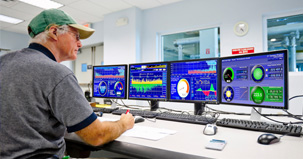- Home
- Smart Data
Smart Data
Actionable intelligence on energy and water use:
- Helps users identify inefficencies, and waste
- Provides real-time feedback on conservation
Right data for the right audience:
- Facility managers identify when and where energy is wasted
- CFO's can track and verify financial savings from initiatives
- Company knows its carbon and water footprint
Related Products
 Information any time, anywhere
Information any time, anywhere - Smart User
Smart User
Smart users leverage real-time data and reduce energy and water use by:
- Continuously identifying opportunities
- Acting on opportunities
- Tracking and verifying savings
- Sustaining savings
Related Products
 Monitor, Manage, Maintain
Monitor, Manage, Maintain - Smart Community
Smart Community
A smart community is one where all stakeholders are engaged in energy and water conservation. A smart community can be achieved by:
- Showing people precisely how much they are using
- Providing real-time feedback on conservation actions
- Effectively communicating efficiency results
Related Products
 Communicate and Conserve
Communicate and Conserve - Smart Grid
Smart Grid
Smart grid, as we define it, is a "green grid", with efficient resource use and the key to a low-carbon future. We help our customers prepare for the smart grid by:
- Engaging users with smart data
- Enabling smart users to increase resource efficiency
- Educating & empowering smart communities
Related Products
 Smart grid and a smarter future
Smart grid and a smarter future - Smart Buildings
Smart Buildings
Smart buildings maximize resource (energy, water, capital) efficiency. These buildings are optimized using energy and water management process with high data visibility which lead to reduced energy and water spending.
- Higher operating income and higher asset values for owners
- Increased productivity for occupants
- Lower carbon footprint for the community
 Resource efficient buildings
Resource efficient buildings
Recent Posts
Educate Yourself! Green the World
It used to be that eager high school graduates entered college with an eye on the future – that included confidence that they would pursue a major that would undoubtedly land a dream job after graduation. Current economic realities are forcing students to rethink career choices because they realize that getting a job at all is no longer a sure thing.
That’s why it’s more important than ever before to pursue careers having global interests – and not just personal ones – in mind. With responsible energy usage becoming an increasingly popular topic, careers in the green market may be just the place where those two worlds collide.
People who have an interest in the environment, technology, global initiatives and more are finding a home in classrooms where energy conservation is the topic of the day. And, this is not only for fresh-faced high school graduates setting out on a new career. These classes range from lectures in communities that fuel local initiatives to university courses for credit toward a degree.
The examples of energy conservation-focused courses are numerous. Besides taking pains to familiarize teachers with energy conservation tips and figures, the state of Texas has instated what is called the Energy Education Curriculum. This program helps to ensure that students are being exposed to information that will help them to cut back on wasteful energy use. Texas’ State Energy Conservation Office designed the Energy Education Curriculum jointly with the Alternative Fuels Research and Education Division of the Railroad Commission.
An Illinois project called Greening Schools is geared toward spreading an energy-friendly curriculum throughout the state. In addition to their curriculum, the organization makes information on green building upgrades available to the public. The project is a joint effort between the Environmental Protection Agency and the Illinois Waste Management and Research Center.
In addition to these examples, the United States Department of Energy (DOE) also offers nationwide curriculums for educating children about energy conservation.
Many of these courses are designed by more than one organization, which shows the emphasis on collaborative learning that has developed around energy conservation. People and organizations are sharing their information with each other, so that everyone ends up with more. Even the structure of these courses, often having a strong emphasis on group work, is indicative of this attitude.
There are also examples of companies releasing technologies that utilize a collaborative learning approach online. For example Noveda, an energy and water management company with headquarters in Branchburg, N.J., has released the iTerate platform, which is designed to do just that. The platform is a real-time, collaboration-based system, and allows users to learn more about the particulars of energy conservation. This is one example of how online interaction can be utilized in a collaborative way.
For those interested in a career in energy efficiency and renewable energy, the U.S. Department of Energy offers a wide variety of courses on the topics. In fact, you would be hard-pressed to find a college or university that doesn’t offer classes, as perhaps even concentrations or degrees, which encourage students to pursue green careers.The focus on education of responsible energy practices helps to prepare our young minds for a future of energy conservation. The benefits of such courses are obvious.



